Matt Hill opens up about health issues in China, rising up the calling ranks and what a Melbourne Cup is really like
When is comes to calling a tight finish in a big race, Matt Hill is the best in the business. But as good as he is, there is one place he refuses to venture - the world of social media. This is why.
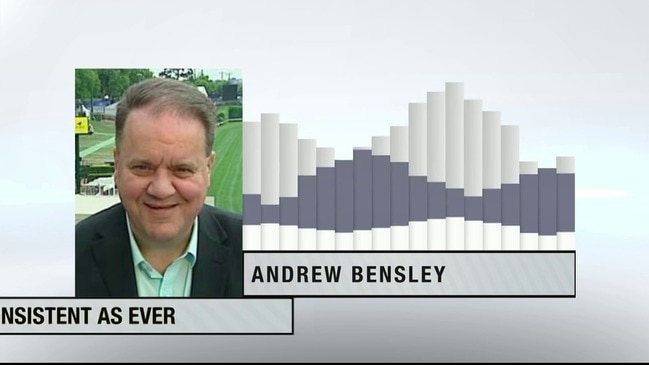
Of all the sports to broadcast, horse racing might well be the most complicated.
Different silks to be familiar with every race. Horses often being seen for the first time as they enter the mounting yard 10 minutes before they jump.
Dozens of horses jostling for position in a blur galloping quicker than you can drive a car in your local town. Multiple moves all being made at once.
And all of this being watched and listened to by punters who’ve wagered vast sums relying on your accuracy.
Matt Hill took over calling Victorian racing from a broadcasting master, and in four years has done a superb job of filling Greg Miles’s shoes.
Exceptionally accurate, humble and talented, Matt gives the vision of racing an important soundtrack.
Watch sport on Kayo. Anywhere. Anytime. Just $25/month, cancel anytime. New to Kayo? Get your 14-day free trial & start streaming instantly >
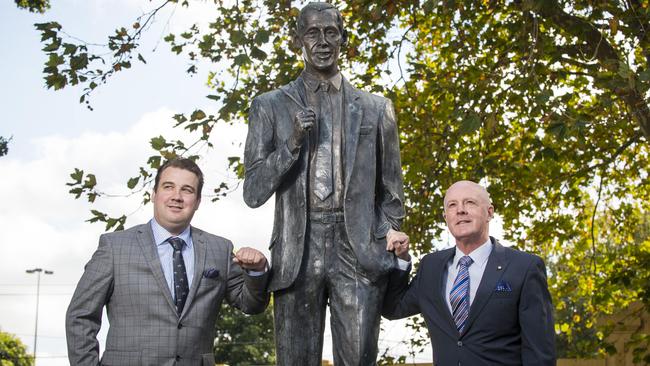
HM: Matty, how close were you to dying in 2008?
MH: Perilously close. I contracted melioidosis, which is a bacteria you get through poor air, or dust, which I got in China at the Olympics. Acute melioidosis has a death rate of 90 per cent. I was told that if I was a smoker, or was unfit, I would have died for sure. I was close.
HM: You were air evacuated out of China?
MH: Yes, from China to Hong Kong. When I was in China, Ray Hadley organised the Australian team doctors to visit me in the hospital. They said: “We need to shift him out — Hong Kong’s the best place.” Hong Kong had a professor there that looked after the SARS outbreak, so he knew what was going on. They gave me six types of antibiotics and that saved my life. I was in hospital for around five to six weeks. Life changes when you go through something like that.
HM: In what way?
MH: Little things don’t matter as much and big things matter more. The fact that you didn’t put the bins out last night means stuff all! Your family means a lot, your work means a lot, and you pick the eyes out of the things you love in life. Afterwards I was dealing with a little bit of trauma from it, so I had to come through that and, to be honest, still probably have a little bit of it. It was full on.
HM: What are the side effects now, trauma wise?
MH: My doctors said the lingering effect will be depression. I’m a very happy-go-lucky type of person, but it can trigger if I dwell on 2008 too much. When you are very sick like that it can knock your confidence and trust in your own body, too.
HM: You’ve broadcast five Olympic Games, and called football and tennis, — you’re exceptionally versatile but we know you as the voice of racing now. If you had a choice, would you be a multi-sport broadcaster of just racing?
MH: That’s a good question. It’s funny, because I’ve wrestled with it all of my career. When I was a kid, I was desperate to be Greg Miles — I wanted to be a race caller. But I’d also sit at home pretending I was hosting Sports World, being Bruce McAvaney. They were my greatest influences. I had two choices every weekend — go to the footy with Gran at the Western Oval to watch the Bulldogs, or go to Flemington and watch the races with Grandad. I was never sure which to choose, but I wanted to be a race caller from a very young age and racing was the bug I caught first, I guess. If you can call a horse race, my view is you can call anything. It gives you that spirit to try other things. I love sport. I’m very curious about other sports and I love testing myself. It’s not disappointing, but there’s a part of me that is yelling to the world saying I can do other things! Whatever else I do in media in the next 30 years, I’ll always be thought of as a race caller.
HM: Your grandfather was a barber who used to tell everyone they couldn’t have a haircut on Saturday afternoons?
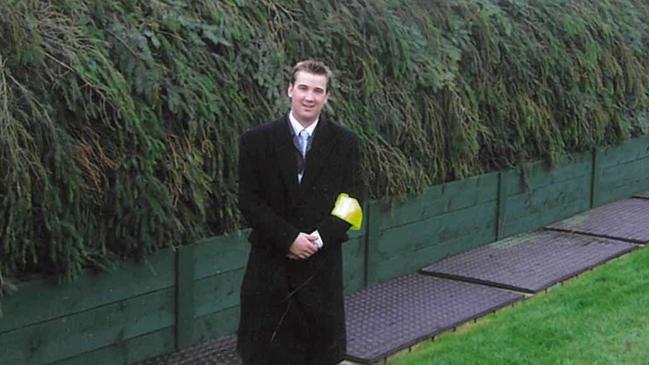
MH: That’s right, he used to shut the shop! He had a barber shop in Tottenham in Melbourne’s west and he would go with his best mate to the races, close at about midday on a Saturday. He absolutely loved it and then when I got a love for racing as a young guy at 12 or 13, it rekindled his interest in racing and we used to go all the time together. They were special times — he adored it and so did I. Grandma was addicted to the Bulldogs games. She went everywhere, so I had the option of going to either. That was my upbringing in Altona.
HM: Who introduced you to Jack Dalton?
MH: My God … how do you know about Jack? I met Jack as he actually dated my mother! Mum and Dad separated when I was very young. He was a trainer of a small team of racehorses. That was my first up-close insight into racing because we’d go and see Jack at his property in Darley, near Bacchus Marsh, and I got hooked from there. I used to travel in the horse floats with the horses to Mortlake and Dunkeld and the far-flung country tracks, and just loved it.
HM: You used to head to Flemington and sit quietly in the stands and record your calls into a tape, didn’t you?
MH: I did as a young teen. The first tapes I didn’t send to anyone because I struggled so much and sounded a long way from where I needed to be! Like a lot of race callers, when they first get a pair of binoculars and go to the track and the gates open, your mouth opens but you don’t know what to say. I started with a little pair of binoculars, and I’d sit in the grandstand with a little Dictaphone. I’d start with the small fields, pick five races that had seven or eight runners in it, and just try to get a bit of rhythm. Then I discovered that there were spare broadcast boxes at the track, so I was able to set myself up with a little camera tripod and a proper set of binoculars and sit in a spare broadcast box. From that point on it was full steam ahead. I would have been 15.
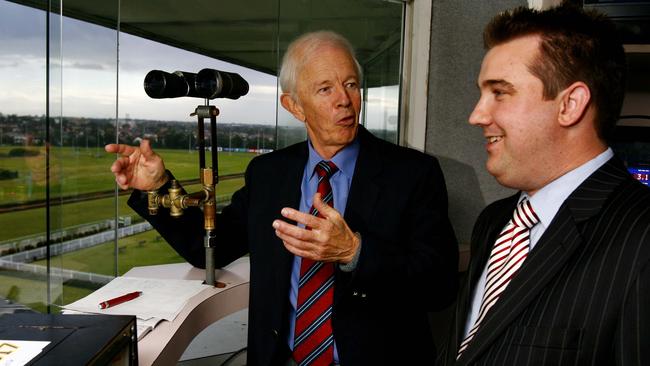
HM: How did you get your break?
MH: I kept at it, and then when three or four races were quite good, I’d send them to Greg Miles or Dan Mielicki. Once you have that relationship, people start to notice you, and you get thrown a few barrier trials here and there. I was asked to call the greyhounds at the non-TAB meetings. That’s where it started.
HM: Were they paying gigs?
MH: They’d usually pay, but not always! The first-ever time I got on a public address system was when Werribee used to have greyhounds — just two dogs up the straight! I did a couple of races there. Steve Cairns was the program manager at Sport 927 and said, “I like your greyhound calls, I’m going to give you a go.” He sent me to the Geelong greyhounds on Friday nights where I called a couple of dog races next to Ron Hawkswell. I kept doing that for about 12 months. I used to get the 347m maidens late in the night! Eventually I was awarded the John Tapp Scholarship with Sky when I was 19. From there you are taught to call and given a lot of opportunity.
HM: Ten years later when you were 28 you were given the nod to take over from Ian Craig, who was the voice of Sydney racing. Huge shoes to fill.
MH: They were, but you always are eager to progress if you have ambition. I’d done a fair bit filling in for him, so it was pretty exciting. Nerve wracking, but exciting.
HM: Replacing a familiar, legendary voice, means comparisons.
MH: You know when you replace a doyen you’re going to be compared. That’s the hardest bit. I don’t think I’ve been more nervous than the first month taking over from Ian, or the first month taking over from Greg Miles because you just know that if anyone’s going to sit there and compare, or criticise, it’s going to be then.
HM: Are you on social and aware of the outer’s view on race day?
MH: No, I’m not on anything! Greg suffered badly from it and that is a travesty, and personally, I can’t see the upside of me having it. In different professions there is an upside, to get your name out there and things like that, but for a race caller, you’ll never get a more emotional person than someone that’s had a bet, and lost, it affects their hip pocket and their rational thinking. As a result, I don’t think being on social media is a good idea. I’m pretty sensitive anyway, especially if I think someone is wrong in their criticism. I’d really stew on that. The other thing about it, Hame, is that the pressure we’re under to learn those horses week in week out, we’ve got to concentrate so heavily. It’s all about concentration. Even races you call on a weekly basis where you think to yourself, come on, concentrate. Stop thinking about what you’re doing tonight, you’ve got to really concentrate. You can’t have one negative thought in your brain. It’s literally like someone is standing there serving for a tennis match, the last thing you want is a negative thought in your brain. If you’ve got 24 runners coming at you at Flemington, where you could easily slip up or call the wrong horse, the last thing you want is a negative thought from some punter who’s frustrated with you for losing the week before. I just avoid it like the plague. If they were saying lovely things, or bad things, I wouldn’t know.
HM: Calling the Melbourne Cup. It might be the most listened-to three minutes of sport each year in this country.
MH: You feel the weight of the role and understand the gravity of it. Every news bulletin has the last 200m of the race on. Every radio station’s playing the replay. So you realise its importance and need to get it right. It’s the hardest race we do all year. Even if you think, “There’s 24 runners, I do this every week, it’s going to be all right”, with two minutes to go, you know that everyone’s listening. That is hard to extinguish from your thoughts. It’s a long race, a big field, you’ve got to see them properly, so overall your head’s spinning by the end of it. You’re pretty happy to get out of there and think that the job’s done, but when you look back on the Melbourne Cups you’re pretty proud of yourself.
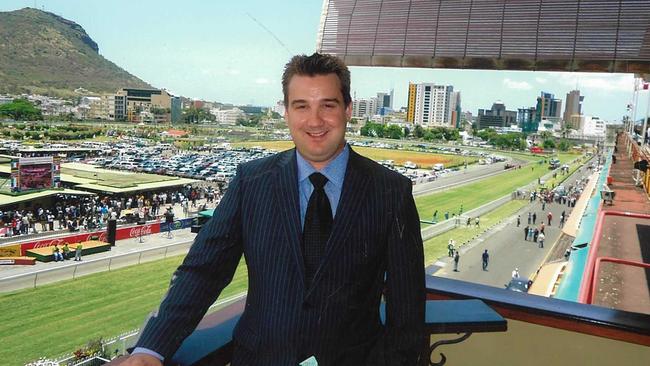
HM: Do you call the Cup differently to other races?
MH: Yes, because of the importance you play your game differently. You are more cautious, you don’t feel free. You can call some big races through the year and let yourself hang a little bit, but with the Melbourne Cup it’s really a matter of just getting through it and not making a mistake. The actual task of it is a bit tougher, too, with things like the marquee in the middle of the track. Flemington’s not the easiest track to call at.
HM: Have you had a moment of significance you’d love back?
MH: The one race I would like back was last year’s Melbourne Cup. It was all happening, and I’m probably a bit harsh on myself, but horses hit the line locked together, and as a result I missed Surprise Baby running fifth. By the time I got the four out and I got back to seeing the horses in the run on, Surprise Baby finished so fast that he’d come storming past and ended up in front of them all, but I missed him. If only I’d spat his name out, it would have been perfect, but I didn’t, I missed him.
HM: Having said that, you got the first four right in one of the tightest finishes in the history of the Cup.
MH: Correct, but a lot of people would have backed Surprise Baby, and I didn’t do them justice. If you’re driving in the car listening to the Melbourne Cup, it’s all about painting a picture. There was a little stroke of the brush that didn’t quite connect with the canvas.
HM: A maiden at Newcastle of 14 horses. How long do you need to get the names and the silks right?
MH: Usually about 10 minutes.
HM: That’s it!
MH: Yep.
HM: I just don’t understand how you can do that.
MH : The brain has been trained to do it. All the way from those days at Flemington when I was 15, I’d have to really work on learning those colours. It was like having a school test, I’d just learn, and learn and learn them. It would take me a long time. But, 25 years on, my brain has been trained to learn and dump them. It’s got into a pattern, and on the actual day, because it’s more photographic memory, I can’t really learn them off a page. You have to actually see the jockeys mount up on the horse. Once they do that, then I can put the name to the colours.
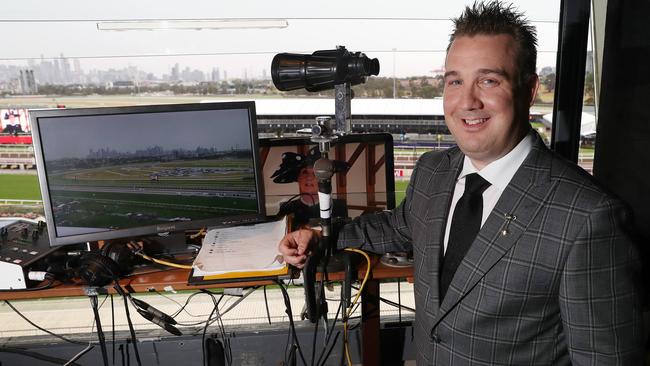
HM: What’s the longest race you’ve ever called?
MH: The Grand National for the BBC. It was 4½ miles. In the Czech Republic I did a race called the Velka Pardubicka, which is over 6600m.
HM: What’s the biggest field you’ve ever taken on?
MH: Forty in the Grand National.
HM: How did you go?
MH: It was actually quite funny. The last Grand National I called was 2018. Tiger Roll was the horse that won the race. He was 20 lengths in front with about 100m to go. I declared him winning, but he just stopped as he was out of tickets. I learnt my lesson: if you’re calling a horse a long way in front at the end of 7200m, don’t go the early crow! He held on and just won — just.
HM: And in terms of your best calling moment, how close does Mo Farah winning in front of his home crowd over 5000m in London get?
MORE SPORT
Sports quiz: Test your knowledge with these questions
MH: That was it. It was the most fantastic race. It was London’s Cathy Freeman moment. The joint was rocking.
HM: If you had the option to call a 2020 AFL Grand Final or 2020 Melbourne Cup, what are you doing?
MH: Can I do both?
HM: They’re in different months …. well, maybe not this year ….
MH: For me, the 2020 AFL Grand Final, because I’ve done three Cups and a Grand Final would be a highlight, and I know I could do it. A footy game, or even athletics race, you’ve got people around you. When it comes to a Melbourne Cup, it’s you. It’s the loneliest place to be on a racecourse. Some people embrace it, and some people are petrified by it. There’s a bit of both with me!
HM: Every broadcast I’ve ever heard that’s had you involved has been enhanced – you’re bloody good.
MH: Thanks, Hame. I really appreciate you chatting to me.
